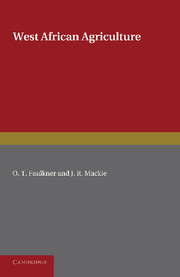Chapter 8 - Extension Work
from PART I - GENERAL
Published online by Cambridge University Press: 05 June 2016
Summary
The best principles to be followed in the extension of improved agricultural methods is a fruitful subject of discussion in most countries, and especially in those of which the people are illiterate or but slightly educated.
The extension of agricultural practices involves two measures: first the introduction of the new crop, variety, or practice to the farmers, and secondly the steps that are necessary to make its adoption possible or profitable. These latter measures are often very important and may involve the organization of a supply of the new seed in a pure condition; or the control of marketing, so that the pioneers may not fail to obtain the value of their new type of produce because the quantity is at first too small to attract the attention of the trade; or the provision, usually through the agency of co-operative societies, of the capital that the farmer needs for the new undertaking. These measures are often matters of some difficulty, and they are unquestionably an essential part of the functions of Government in such countries as West Africa. Such measures may perhaps seem to some to be outside the functions of Government, and they certainly are liable to lead to an undesirable diversion of the energies of the Agricultural Department into the business of seed supply or the organization of markets. But they are generally inevitable. It is, for instance, quite useless to ask a farmer to grow a new superior variety of export crop merely because it will command a higher price than the ordinary, if, in course of time, it should completely replace the ordinary. Such a distant conditional promise is of no use to anyone; it is necessary to assure the farmer that measures will be taken to obtain the proper price for him next harvest, however small may be the total quantity of the new superior type. The lack of such measures has in the past led to the failure of many “improvements”. But the measures needed in each instance, and in each country, are peculiar to the special circumstances, and can hardly be usefully discussed in general terms. It is proposed to deal here chiefly with the steps to be taken in introducing the new variety or method.
The oldest method might be described as that of universal official propaganda.
- Type
- Chapter
- Information
- West African Agriculture , pp. 76 - 90Publisher: Cambridge University PressPrint publication year: 2013

